by Pinchas Cohen
Key Events
Global investors started the penultimate week of 2017 trade in high spirits this morning, apparently eager to finish this record-setting, wholly unexpected year from an elevated market perspective.
Australia’s S&P/ASX 200, both India’s Nifty 50 and BSE Sensex, as well as all three major Chinese indices—Hong Kong’s Hang Seng, the mainland’s Shanghai Composite and the blue-chip Shanghai Shenzhen CSI 300 Index—climbed higher.
The exuberant kick-off to the week comes on the heels of Friday's quadruple record-setting day for U.S. major indices.
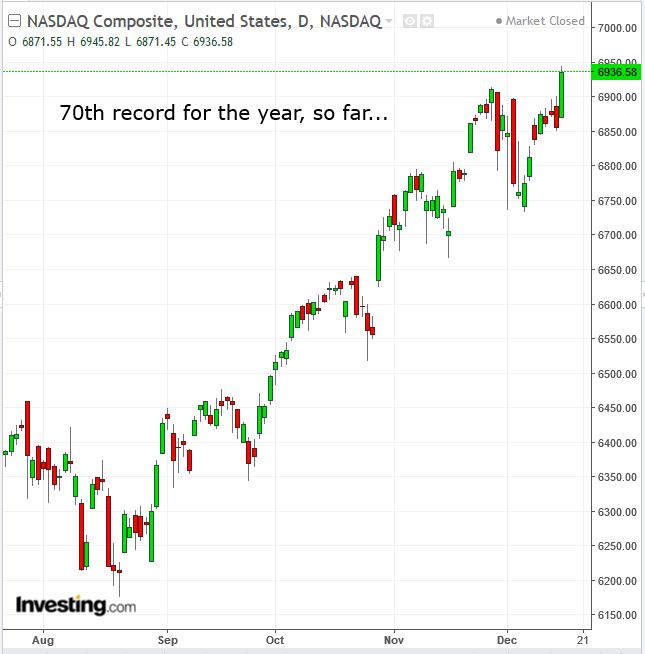
The Dow hit its 68th record high; the S&P 500 made its 61st high; the NASDAQ Composite rose to its 70th record and the 'laggard' Russell 2000 made its 23rd record, all fueled by optimism that U.S. tax reform, designed to boost growth in the world's largest economy, was finally on its way.
Global Financial Affairs
Trading on India’s BSE Sensex fell earlier today, as much as 2.6 percent, after news broke that Indian Prime Minister Narendra Modi's party may have weakened in state elections, but in fact he's set to return to power in his home state of Gujarat. Upon confirmation of the victory, losses reversed. The election is considered a bellwether for the national vote in early 2019.
The Shanghai Composite recovered from an early decline triggered by ongoing concerns over tighter year-end liquidity after the PBoC lifted interbank market rates, but home price data supported prices, improving trader sentiment before the close.
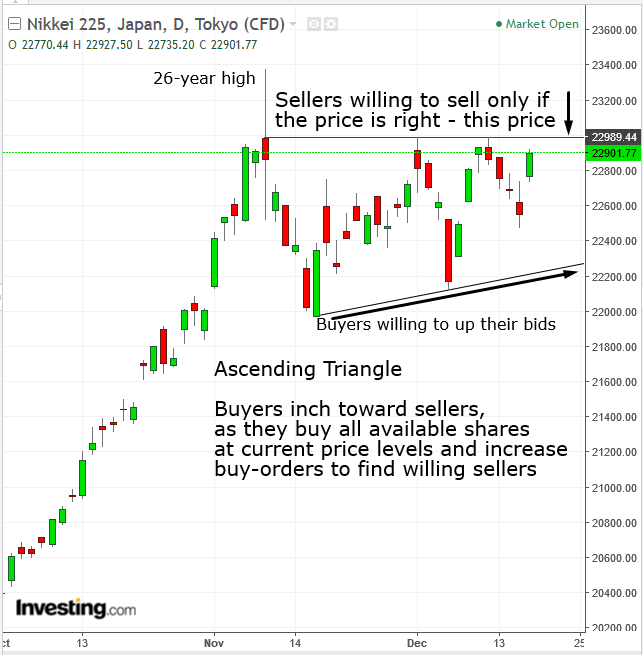
Japan's Nikkei 225 leaped 349 points, or 1.6%, to finish near 22,902. Financials and exporters outperformed, returning the index to within 2 percent of its 26-year high, as it forms an Ascending Channel, whose upside breakout of the 23000-price level would signal a rally to test the 24000 level.
In European trader, the Stoxx Europe 600 Index rose for the first time in three sessions as automakers and technology stocks led gains. Core European bonds declined, while those in the periphery edged higher.
Investors continue to focus on the progress of U.S. tax reform as the year winds down. Mid-week votes in the House and Senate this week are planned for the legislation which is supposed to reduce corporate and individual tax rates. Lawmakers are aiming to have the bill land on President Donald Trump’s desk in time for a signature before Christmas.
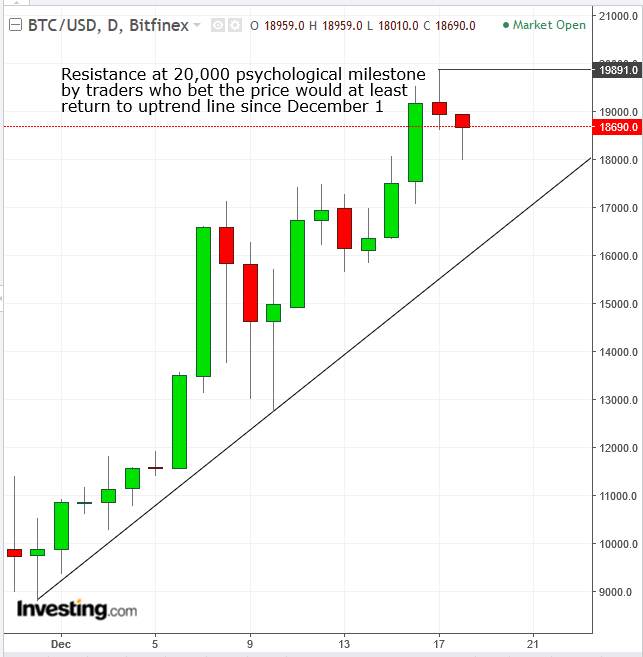
Bitcoin traded near $20,000 as futures trading debuted on the Chicago Mercantile Exchange. The CME is the world’s leading and most diverse exchange, giving the cryptocurrency further cachet as well as access to mainstream institutional investors.
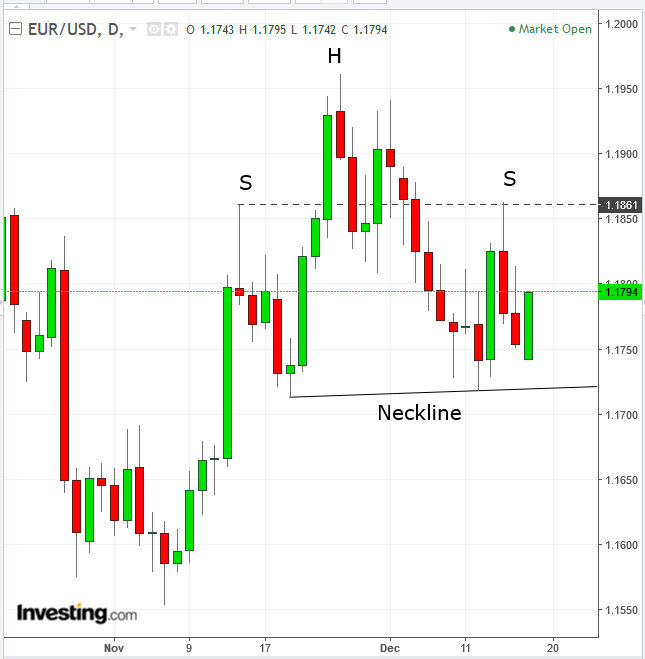
The euro recovered this morning, after two days of declines.
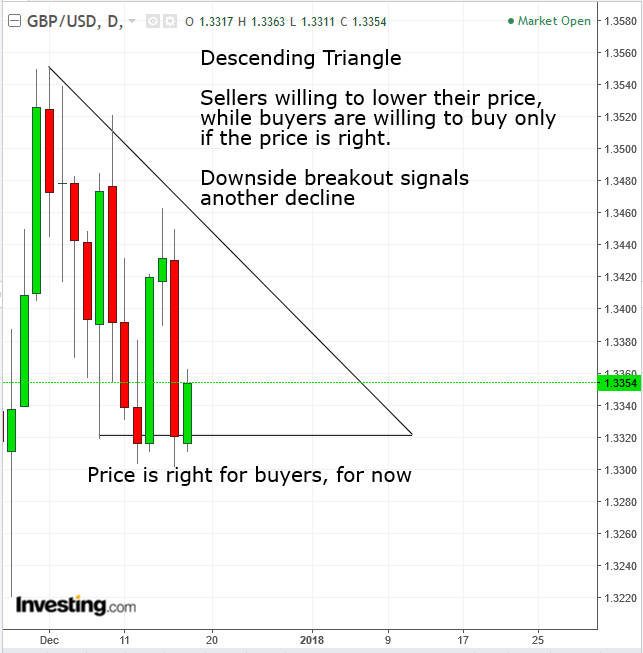
Sterling moved higher today, ahead of U.K. Prime Minister Theresa May setting out her plan for a proposed Brexit transition period. Whether the EU approves, or not, technicals for the GBPUSD signal Cable could be headed lower in the longer-term.
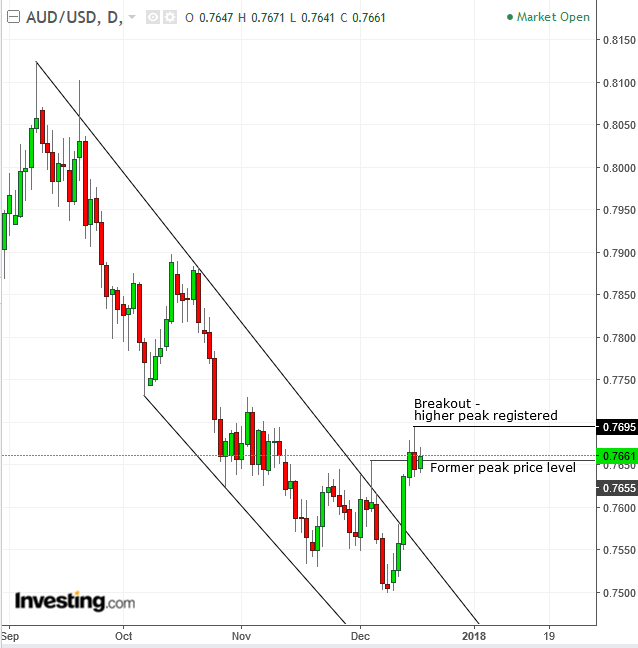
The Australian dollar advanced to more than a five-week high, after the country’s government forecast its budget deficit would shrink faster than anticipated. The Australian dollar was up 0.1 per cent to U.S.$0.7650—within striking distance of Friday's high of U.S.$0.7694—a level not seen since early November. Australian sovereign bond yields rose along with U.S. Treasury yields.
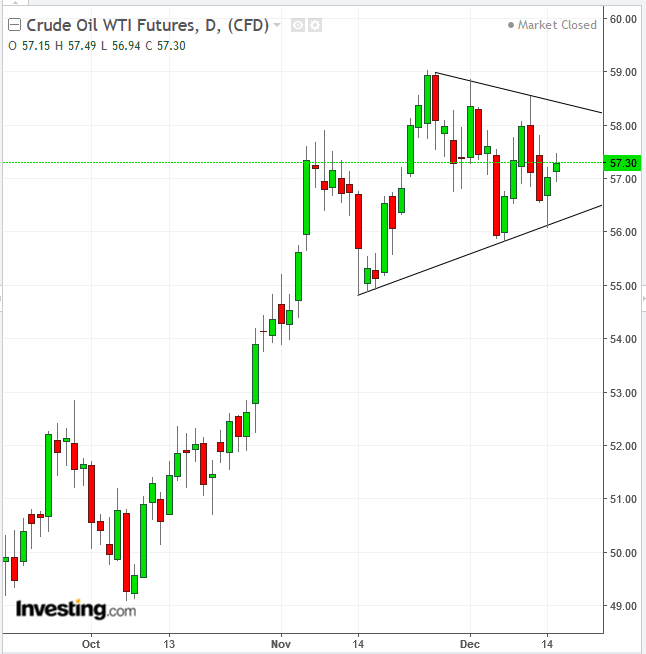
Oil is moving higher for a third day, toward $57.92, as U.S. drillers targeting crude reduced the rig count for the first time in four weeks. It's the highest price for the commodity before the formation of a potential symmetrical triangle.
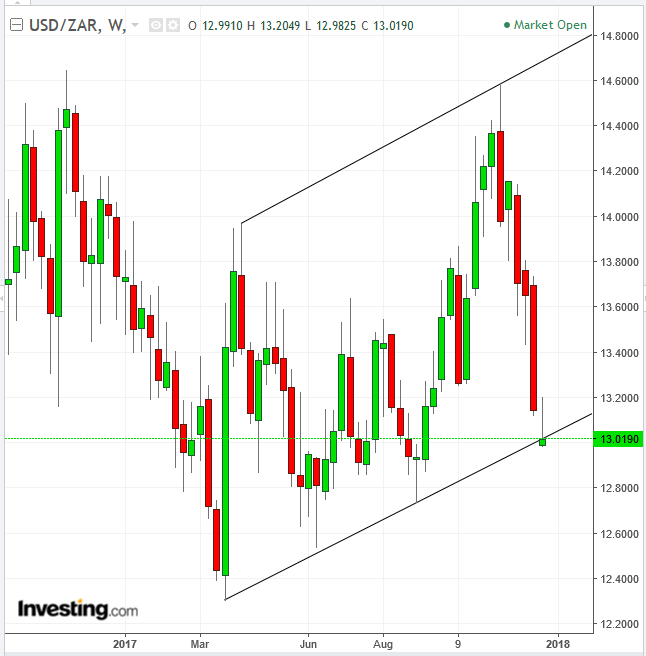
In emerging markets, South Africa’s rand fluctuated ahead of the ANC ruling party’s leadership vote, now scheduled for Monday.
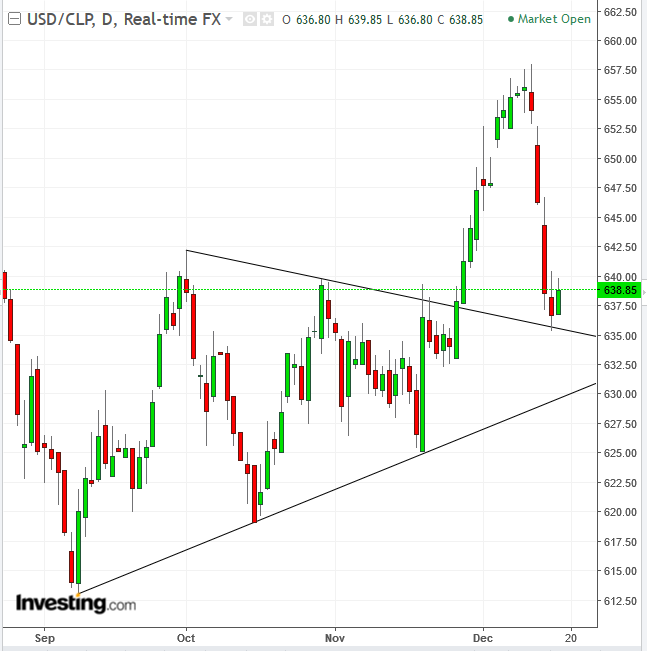
Chile’s peso may gain after Sebastián Piñera, a business-friendly candidate, won the South American country’s presidential election.
Up Ahead
- President Donald Trump delivers a national security speech later today, where he will call out China for engaging in “economic aggression,” the Financial Times says.
- Xi Jinping kicks off China’s Central Economic Work Conference on Monday. Investor focus will be on whether officials will cut the '6.5% or higher' growth target.
- U.K. Prime Minister Theresa May addresses Parliament Monday and meets her cabinet Tuesday to begin work on a trade wishlist for the post-Brexit era. Europe will unveil its stance Wednesday.
- The disruption to the UK's Forties Brent oil pipeline is key for commodities traders this week. Details about the extent of the damage and a restart date could come at any time.
- The U.S. and U.K. publish updated estimates of third-quarter GDP on Thursday and Friday respectively; the U.S. releases PCE data on Friday.
- Germany's December Ifo Business Climate Survey is released on Tuesday.
- Catalonia’s secessionists are at risk of becoming a minority in the Spanish region’s parliament as the main pro-unity party is set to add seats in Thursday’s election.
- The Bank of Japan meets to set monetary policy. The Czech Republic, Hungary, Taiwan and Thailand also set interest rates this week.
Market Moves
Stocks
- The Stoxx Europe 600 Index climbed 0.8 percent as of 8:17 London time (3:18 EST).
- The U.K.’s FTSE 100 rose 0.7 percent to the highest in six weeks.
- Germany’s DAX rose 0.9 percent to the highest in almost six weeks.
- Japan’s Nikkei 225 Stock Average climbed 1.5 percent to the highest in a week.
- The MSCI Asia Pacific Index climbed 0.8 percent to the highest in almost three weeks.
- The MSCI Emerging Markets Index gained 0.4 percent to the highest in almost three weeks.
- S&P 500 Futures increased 0.3 percent to 2,690.25, the highest on record.
Currencies
- The Dollar Index declined 0.23 percent, ending a two-day rebound from its December 12 high, which now provides it resistance.
- The euro climbed 0.2 percent to $1.1778.
- The British pound rose 0.2 percent to $1.3352.
- The Japanese yen dipped 0.1 percent to 112.71 per dollar.
Bonds
- The yield on 10-year Treasuries climbed two basis points to 2.37 percent.
- Germany’s 10-year yield rose one basis point to 0.31 percent.
- Britain’s 10-year yield gained less than one basis point to 1.154 percent.
- Japan’s 10-year yield dipped less than one basis point to 0.042 percent, the lowest in two weeks.
Commodities
